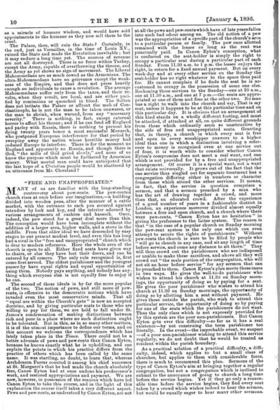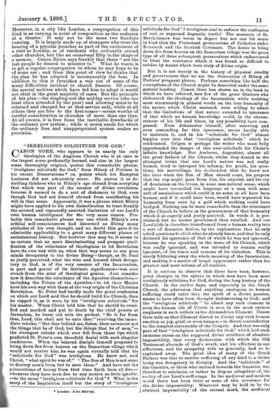"FREE AND UNAPPROPRIATED."
MANY of us are familiar with the long-standing controversy about pew-rents. The pew-rented church rises at once before our imaginations,—a building divided into wooden pens, after the manner of a cattle market, with the entrance to each pen secured against intruders by lock and key, and the interior adorned by various arrangements of cushion and hassock. Once, indeed, the pew stood for a great deal more than this. The conception would have been incomplete without the addition of a larger area, higher walls, and a stove in the middle. From that older ideal we have descended by easy stages to our present modest level, and even this has long had a rival in the" free and unappropriated" church which is dear to modern reformers. Here the whole area of the church is open to all. Either fixed seats have given way to chairs, or else they have lost their doors, and can be entered by all corners. The only rule recognised is, first come first served. The oldest parishioner and the youngest passer-by have equal rights and equal opportunities of using them. Nobody pays anything, and nobody has any- thing which everyone else is not equally free to enjoy if he can.
The second of these ideals is by far the more popular of the two. The notion of pews, and still more of pew- rents, is offensive to the democratic notions which have invaded even the most conservative minds. That all "equal are within the Church's gate" is now an accepted doctrine, and by giving particular seats to those who are willing to pay for them, we are held to fall under St. James's condemnation of making distinctions between rich and poor in a place where no such distinction ought to be tolerated. But in this, as in so many other matters, it is of the utmost importance to define our terms, and on this account we welcome the correspondence which has lately taken place in the Times. There could not be a better advocate of pews and pew-rents than Canon Eyton, because he knows exactly what he is upholding, and, can explain the points in which his practice differs from the practice of others which has been called by the same name. It was startling, no doubt, to learn that, whereas Archdeacon Farrar counted it among his chief successes at St. Margaret's that he had made the church absolutely free, Canon Eyton had at once undone his predecessor's work, and restored appropriations and payment. We are now, however, in possession of the reasons which have led Canon Eyton to take this course, and in the light of this explanation the course itself takes a very different aspect. Pews and pew-rents, as understood by Canon Eyton, are not at all the pews and pew-rents which have of late years fallen into such bad odour among us. The old notion of a pew was the appropriation of a specific part of the church's area to a particular person or family. The pew once allotted remained with the lessee 50 long as the rent was punctually paid. In Canon Eyton's conception, what is conferred on the seat-holder is simply the right to occupy a particular seat during a particular part of each Sunday. From 11.30 a.m. to 1 p.m. the lessee enjoys the right, in return for a fixed annual payment. But on every week-day and at every other service on the Sunday the seat-holder has no right whatever to the space thus paid for. He cannot complain if he finds the seat he is ac- customed to occupy in the possession of some one else. Reckoning three services to the Sunday—one at 10 a.m., one at 11.30 a.m., and one at 7 p.m.—the seats are appro- priated at one of them and free at the other two. No man has a right to walk into the church and say, That is my seat, unless it happens to be at this particular time and on this particular day. It is obvious that an arrangement of this kind stands on a wholly different footing, and must be attacked, if attacked at all, on quite different grounds from those which ordinarily seem so unattractive by the side of free and unappropriated seats. Granting that, in theory, a church in which every seat is free and open to every worshipper answers to a higher ideal than one in which a distinction involving a refer- ence to money is recognised even at one service out of four, it is worth while to consider whether Canon Eyton's compromise does not meet a real want, and one which is not provided for by a free and unappropriated arrangement. Of course it is a special want, not a want that exists universally. It grows out of the fact that the one service thus singled out for separate treatment has a congregation differing either in numbers or character from those which attend the other services. It means, in fact, that the service in question comprises a sermon, and that a sermon preached by a man who has the art of drawing together a crowd, and more than that, an educated crowd. After the experience of a good number of years in a fashionable district in London, an experience moreover divided almost equally between a free and open church, and a church where there were pew-rents, "Canon Eyton has no hesitation" in giving the preference to the latter system. The reason is that "in the case of a popular church on Sunday morning the pew-rent system is the only one which can even attempt to secure the rights of parishioners." Without pew-rents the church is sure to be filled by people who " will go to church in any case, and sit any length of time before service, and come any distance to sit there." They will thus crowd out the parishioners who are indisposed or unable to make these sacrifices, and above all they will crowd out "the male portion of the congregation, who will not sit an hour before service" for any sermon that can be preached to them. Canon Eyton's plan meets these cases in two ways. He gives the well-to-do parishioner who wishes to attend his church at 11.30 on Sunday morn- ings, the opportunity of doing so by paying for a seat. He gives the poor parishioner who wishes to attend his church at 11.30 on Sunday mornings, the opportanity of doing so by allotting him a seat without payment. He gives those outside the parish, who wish to attend this particular service, the opportunity of doing so by paying for one of the seats which the parishioners do not want. Thus the only class which is not expressly provided for by this system are the poor non-parishioners. But Canon Eyton gets over this difficulty—so far as it has a real existence—by not construing the term parishioner too literally. In the event—the improbable event, we suspect —of a poor non-parishioner wishing to attend this service regularly, we do not doubt that he would be treated as resident within the parish boundary.
As a practical solution of a practical difficulty, a diffi- culty, indeed, which applies to but a small class of churches, but applies to them with considerable force, there is much to recommend this plan. Sermons of the type of Canon Eyton's aim at bringing together a regular congregation, but not a congregation which is inclined to submit to the annoyance of going to church a long time before the service begins. Yet if they go only a reason- able time before the service begins, they find every seat taken by a crowd which wishes indeed to hear the sermon, but would be equally eager to hear many other sermons. Moreover, in a city like London, a congregation of this kind is as varying in point of composition as the audience at a theatre. It may not be the same two Sundays running. It is largely made up of strangers who treat the hearing of a popular preacher as part of the excitement of a visit to London, or of residents who ordinarily attend other churches, but like an occasional fillip in the shape of a sermon. Canon Ey ton says frankly that these "are the last people he desires to minister to." What he wants is to get a regular congregation to whom he may hope to be of some use ; and from this point of view he thinks that the plan he has adopted is incomparably the best. In addition to this it furnishes a way out of some of the many difficulties incident to church finance. Of course, the special motives which have led him to adopt it would not exist in the great majority of cases. But the principle of his plan—the singling-out the midday service (the one least often attended by the poor) and allowing seats to be retained and charged for at that service only, while at all others they are free to the first-corner—seems worthy of careful consideration in churches of more than one type. At all events, it is free from the inevitable drawbacks of the ordinary pew system ; while it meets needs for which the ordinary free and unappropriated system makes no provision.















































 Previous page
Previous page